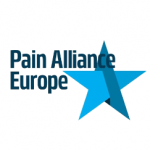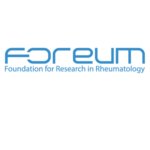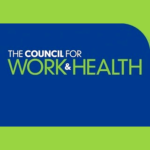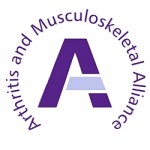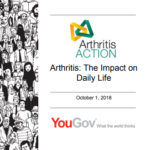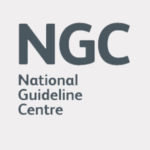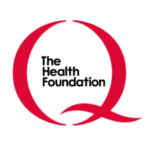 We all know that MSK is one of the two biggest causes of sickness absence in the UK. It’s perhaps no surprise that this is even more true in the construction sector. Every year, occupational ill‐health costs construction employers £848million in reduced productivity, sick pay, cover for absence and replacing staff who leave because of ill health. 76% of this relates to MSK conditions. In February, ARMA brought together some key players in the construction sector with stakeholders such as Department for Work and Pensions and Health and Safety Executive, to look at what might be done to improve this situation.…
We all know that MSK is one of the two biggest causes of sickness absence in the UK. It’s perhaps no surprise that this is even more true in the construction sector. Every year, occupational ill‐health costs construction employers £848million in reduced productivity, sick pay, cover for absence and replacing staff who leave because of ill health. 76% of this relates to MSK conditions. In February, ARMA brought together some key players in the construction sector with stakeholders such as Department for Work and Pensions and Health and Safety Executive, to look at what might be done to improve this situation.…
Read more of this article
Category: Research
Stigma and pain – new survey
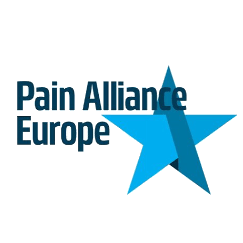 Pain Alliance Europe launched a new survey on stigma and chronic pain. One of the main “fights” PAE is leading is for the pain patient to be heard, believed and understood. The most recent survey developed deals with stigma related to chronic pain and will be open until the 1st of March, 2019.
Pain Alliance Europe launched a new survey on stigma and chronic pain. One of the main “fights” PAE is leading is for the pain patient to be heard, believed and understood. The most recent survey developed deals with stigma related to chronic pain and will be open until the 1st of March, 2019.
Besides the many physical challenges that chronic pain inflicts, patients deal with the psychological burden of having a condition they do not deliberately choose to have.
To understand better to which extent stigma is a part of the illness pack in the life of a chronic pain patient, Pain Alliance Europe has directed its questions for 2019’s survey about chronic pain to the way patients perceive and are affected by the subjectivity of other categories from society that they come in contact with during their pain journey.…
Read more of this article
Open Call for Innovative Medicine
 FOREUM – Foundation for Research in Rheumatology – announces a programme to support innovative concepts to improve the diagnosis and treatment of Rheumatic Musculoskeletal Diseases (RMDs). This programme is designed as an open research call seeking for the best and most visionary approaches to better understand RMDs and to improve the life of patients with RMDs.
FOREUM – Foundation for Research in Rheumatology – announces a programme to support innovative concepts to improve the diagnosis and treatment of Rheumatic Musculoskeletal Diseases (RMDs). This programme is designed as an open research call seeking for the best and most visionary approaches to better understand RMDs and to improve the life of patients with RMDs.
As such, the call is not limited to a specific disease within the RMD spectrum but rather intends to target fundamentally new concepts that have potential to gain concept-changing insights into RMDs.…
Read more of this article
Resource to support GPs in identifying work modifications – user testing
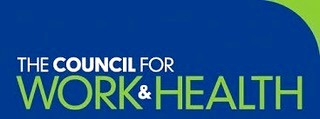
By Steve Boorman, Chair, Council for Work and Health
Work and Health Unit commissioned resource to support GPs in identifying work modifications.
You may be aware from previous contacts and, or consultations, that the Work and Health Unit (WHU), as part of its “Improving Lives” strategic programme, has identified a need to provide additional support resources to Doctors, to help them in supporting patients to identify work adjustments to improve workability and improve recovery.
The Council for Work and Health was commissioned to research and develop this work and a dedicated researcher was used to review published literature, collate existing available resources and to develop content.…
Read more of this article
National survey on use of local anaesthetic knee injections
 BSRM are interested in understanding the variability between UK clinicians in the use of single dose local anaesthetics in intra-articular injections. Clinicians are invited to complete this 2-3 min survey at:
BSRM are interested in understanding the variability between UK clinicians in the use of single dose local anaesthetics in intra-articular injections. Clinicians are invited to complete this 2-3 min survey at:
www.surveymonkey.co.uk/r/KXRFQWN
3rd BSRM National MSK Medicine and Rehabilitation course
The programme for physicians taking place in Leeds, 11-13 Feb, is available here in PDF.
Booking is via the BSRM website.
This 3-day course is aimed at physicians managing non-inflammatory musculoskeletal conditions and will appeal to those in rehabilitation medicine, sport and exercise medicine, rheumatology, pain medicine, radiology, orthopaedics and general practice.…
Read more of this article
MSK Services Survey
ARMA wants to find out what is happening across England’s MSK services so we can learn how best target to our support for improvements.
This MSK Services survey gathers information on the quality of local services, programmes and improvements related to primary care, orthopaedics, rheumatology, pain management, community MSK, and public health. This is part of our Clinical Networks Project, a partnership between ARMA and NHS England.
Our report will be anonymised; no names of individuals, CCGs or STPs will be released.…
Read more of this article
New GBD 2016 UK paper
![]() A new paper published [24 October 2018] in the Lancet highlights regional imbalances in health and reveals the huge burden of disability linked to long-term conditions such as low back and neck pain, anxiety and depression, highlighting the need for health services to adapt to managing these conditions.
A new paper published [24 October 2018] in the Lancet highlights regional imbalances in health and reveals the huge burden of disability linked to long-term conditions such as low back and neck pain, anxiety and depression, highlighting the need for health services to adapt to managing these conditions.
The study uses GBD 2016 data on mortality, causes of death, and disability to analyse the burden of disease in the countries of the UK and within local authorities in England by deprivation quintile.…
Read more of this article
New arthritis survey: the Impact on Daily Life
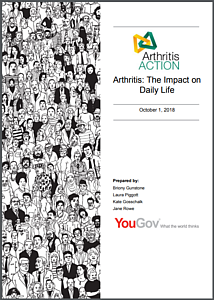 Arthritis Action has released the findings from a nation-wide questionnaire-based study looking into the life impacts of arthritis on people of working age in Great Britain. The research, carried out by YouGov, surveyed 2074 people to reveal the effects that the condition can have on personal well-being, life satisfaction, and mental health.
Arthritis Action has released the findings from a nation-wide questionnaire-based study looking into the life impacts of arthritis on people of working age in Great Britain. The research, carried out by YouGov, surveyed 2074 people to reveal the effects that the condition can have on personal well-being, life satisfaction, and mental health.
It highlights the true impact of arthritis on the millions of people living with it every day, affecting all aspects of their lives, from their mental health to their family life, work, social activities, and physical health.…
Read more of this article
Call for evidence: PHE and NGC review treatment dependence, discontinuation and withdrawal
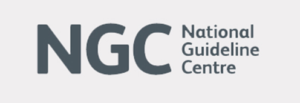 Public Health England has commissioned the National Guideline Centre (NGC) to produce an evidence review of the literature on dependence, short term discontinuation and longer term withdrawal symptom from prescribed medicines, and their prevention and treatment.
Public Health England has commissioned the National Guideline Centre (NGC) to produce an evidence review of the literature on dependence, short term discontinuation and longer term withdrawal symptom from prescribed medicines, and their prevention and treatment.
The NGC is inviting stakeholders to submit research data or reports on two key areas to inform the review:
A) Collations of patients’ experi ences of the harms caused by prescribed medicines and ability to access and engage in treatment specifically relating to dependence, short term discontinuation or longer term withdrawal symptoms from the following prescribed medicines: opioids for chronic pain (excluding end of life /palliative care/cancer pain), benzodiazepines, Z-drugs, gabapentin and pregabalin (excluding epilepsy treatment), and antidepressants.…
Read more of this article
Improving mental health care for people with long term pain
The Q Improvement Lab brings together organisations and individuals from across the UK to pool what is known about a topic, uncover new insights and develop and test ideas. The Q Lab and Mind have just started a 12-month project focusing on improving care for people with a long-term physical and mental health problem, specifically looking at the experiences of people living with both mental health problems and persistent back and neck pain.
Further details about the project can be found here.…
Read more of this article


